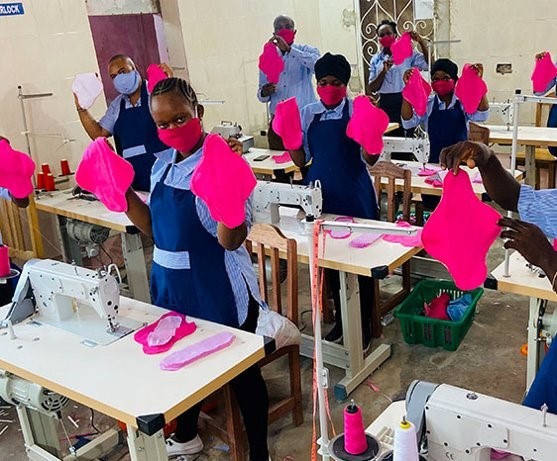Design Challenge:
Design challenge: How might we design and make MHM products available for women in Tanga, Zanzibar, Arusha, and Mwanza in a way that it’s sustainable, affordable, and culturally appropriate so that none of the women will be inhibited by their menstrual cycle in any way
Introduction:
In Tanzania, disposable menstrual products are often too costly for girls and young women and may not be available in all communities. As such, girls may be obligated to utilize unhygienic materials like toilet paper, mattresses, cow dung, dirty clothes, banana fibers and other means in lieu of hygienic menstrual health products. Production of reusable and washable menstrual products exists in Tanzania. Though this is often small-scale and localized production without scaling, it can be a viable and affordable option for low-income women and girls. In other instances, reusable menstrual products may also not be available, or are too costly, or not culturally accepted in all communities for use among girls.
Period poverty illustrates struggle many low-income women and girls face while trying to afford menstrual products. This is particularly because access to affordable menstrual health products is not uniform and imported products and materials are expensive, while few local producers struggle with scaling up their business. This experiment focused on addressing period poverty in Tanzania as a multifaceted developmental challenge that encompasses a diverse array of factors around education, economic, health and dignity of low-income women and girls. The experiment therefore aimed at establishing baseline situation regarding availability of reusable menstrual products, potential logistical challenges, affordability constraints, and cultural impediments to the broader dissemination of reusable products in communities. Two menstrual products were prototyped to establish the feasibility of sustainable production and distribution of these products in communities with diverse cultural and socio-economic contexts, as well as among girls with disabilities.
Results:
The Experiment benefitted 250 girls directly through supply of reusable menstrual health products and associated training and advocacy. Further, there were undocumented indirect beneficiaries through sharing of learning and knowledge by direct beneficiaries with friends and siblings. During the experiment 2-3 months of user testing, schools recorded an improved school attendance with menstruation ceasing to be a reason for girls missing school. There has been no incidence of negative effect on use of the reusable pads.
A key learning from the experiment is that combining Fida’s menstrual health trainings and associated distribution of reusable pads is an excellent way of scaling up impact of the trainings, as well as enhancing participation. Therefore, purchasing reusable pads from Women’s Choice is something that Fida is considering as a way of implementing baseline findings. Women’s Choice Industries are utilizing the experiment baseline findings in product design, marketing and distribution with possibilities of attracting development financiers for impact investment in production of acceptable and reusable menstrual products
Scaling:
As a beneficiaries/community-led research experiment, the experiment will not be scaled as-is, the strategic partnership between Fida International and Women’s Choice Industries in Tanzania will continue in other projects. Further, it is expected that Women’s Choice Industries, a Tanzanian social enterprise designing and manufacturing reusable menstrual products, post-experiment will utilize the information and market intelligence gathered during the experiment for future product development, marketing, and pricing.
Fida International Tanzania: Making Reusable Menstrual Products Accessible (PDF)
